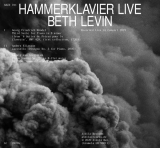In ihrem live beim Festival of Baltimore aufgenommen Recital spielt die amerikanische Pianistin Beth Levin zunächst Händels Suite HW 428. Diese Suite ist meistens auf dem Cembalo zu hören, aber Beth Levin gibt ihr auf dem Flügel einen singulären Rang. Ab dem Präludium sind die geistige Durchdringung und das introvertierte Spiel der Pianistin faszinierend. Selbst das Presto wird nicht virtuos ausgenutzt, sondern bekommt einen unerhörten Grad an Wärme und beendet so ein Universum von zeitloser Schönheit. Die eher kontemplativen Sätze und Passagen erhalten eine besondere Atmosphäre: Levin lässt sie als Momente nachdenklicher Besinnung wirken. Die Aria (5. Satz) ist ein Modell poetischer Gefühlsverströmung.
Die Verbindung von Händel zu Beethoven stellt Carosello – Disegno per pianoforte No. 3 des schwedischen Komponisten Anders Eliasson (1947-2013) her. Seinem Stück gibt Beth Levin durch eine gewinnbringende zeitliche Dehnung eine im Grunde sehr meditative Stimmung.
Nicht weniger ausdrucksstark spielt die Pianistin Beethovens Hammerklaviersonate. Ihre Tempi sind sicher nicht auf der schnellen Seite, aber das Adagio spielt sie nicht so langsam wie so manche ihrer Kollegen. Auffallend sind die Klarheit des Diskurses, das Fragen und Antworten sowie das Vermitteln von Beethovens Atem der Freiheit, mit hier mysteriös suchenden, dort lyrisch-introvertierten Momenten und einer Gestaltungstiefe, die an jene von Levins Lehrer Rudolf Serkin erinnert. Ein rhythmisch fein belebtes Scherzo führt zum Adagio sostenuto, wo sehr poetische und weltentrückte Momente den viel irdischeren, suchenden und grüblerischeren gegenüberstehen. Nicht weniger packend ist Levins Rhetorik im Finale. Tiefe Nachdenklichkeit im Largo kontrastiert mit drängendem Musizieren im Allegro risoluto, das aber immer wieder abgebremst wird, in Gedanken verfällt, um wieder erneut in großer Eile zu starten. So wird die Pianistin dem extremen Charakter des « in drangvollen Umständen » geschriebenen Werks vollauf gerecht.
In her recital, recorded live at the Festival of Baltimore, American pianist Beth Levin first performs Handel’s Suite HW 428, which is mostly played on the harpsichord, but Beth Levin gives it a singular interpretation on the grand piano. What fascinates one from the Prelude onwards is the spiritual and introverted playing of the pianist. Even the Presto is not virtuoso, but acquires an unheard-of degree of warmth, so ending a universe of timeless beauty. The more contemplative passages are given a special atmosphere, Levin lets them work as moments of thoughtful contemplation. The Aria (5th movement) is a model of poetic emotions.
The connection between Handel and Beethoven is established by Carosello – Disegno per pianoforte No. 3 by the Swedish composer Anders Eliasson (1947-2013). Through a profitable stretching Beth Levin gives the piece a basically very meditative mood
The pianist’s playing Beethoven’s Hammerklavier Sonata is no less expressive. Her tempi are certainly not on the fast side, but she does not play the Adagio as slowly as some of her colleagues. What is striking is the clarity of the discourse, the questioning and answering and the conveyance of Beethoven’s breath of freedom. Sometimes the music is mysteriously searching and lyrically introverted, with a depth reminiscent of that of Levin’s teacher Rudolf Serkin. A rhythmically finely animated Scherzo leads to the Adagio sostenuto, where very poetic moments are juxtaposed with much more earthly, searching and brooding ones. Levin’s rhetoric is no less gripping in the final movement. Deep thoughtfulness in the Largo contrasts with urgent playing in the Allegro risoluto, which is, however, repeatedly slowed down, only to start again in great haste. Thus the pianist does full justice to the extreme character of the work written « in oppressive circumstances ».
Link zum Interview mit Beth Levin
























